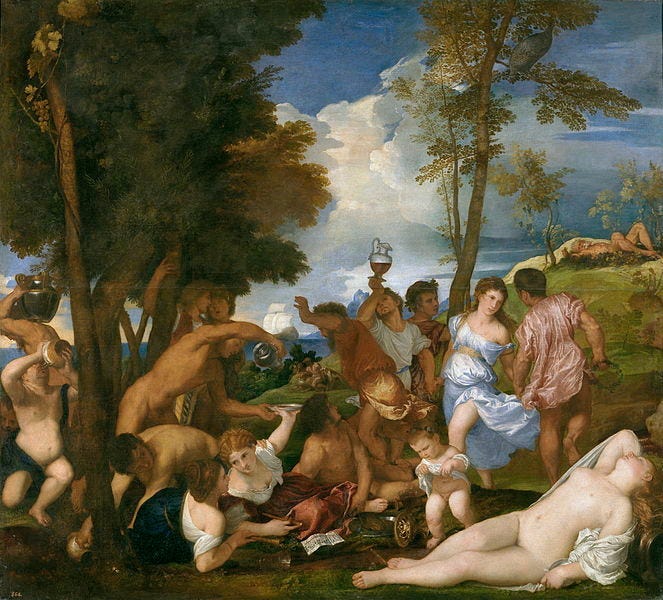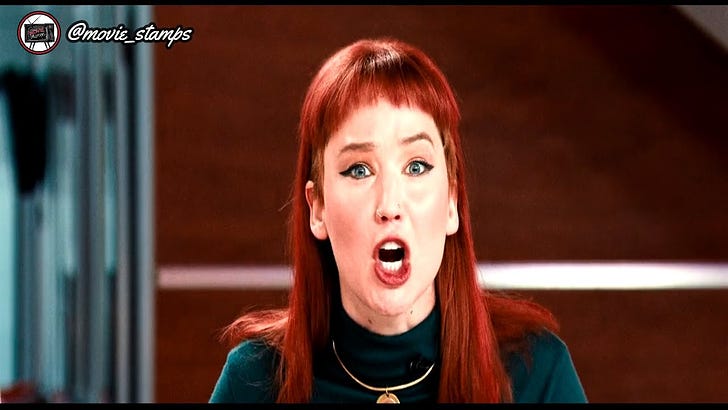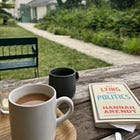Why do people drink alcohol?
everything you use to justify your love of booze is possibly very wrong
I’m currently in the UK doing a bunch of book signings and interviews for the launch of This One Wild and Precious Life in the UK. It’s going well so far, thanks. Nudging towards being an Amazon bestseller. If you want to help it get there…
I’ve noted some fascinating differences in the way the book has been received here in Britain, compared with in the US, Spain, Australia and elsewhere. In the main, there is an incredible reticence to discuss THE ELEPHANT IN THE ROOM (climate collapse). The “problem” is still referred to as the “environment issue”. As though we’re not talking about our own f*cking extinction event. I’m mostly having to discuss fun hiking hacks and the whole three pairs of undies thing. Of course I slip in a bit of Kate-inspired “WE’RE ALL GOING TO DIE!!” truth bombs where I can.
I’m having to stay on top of my other work on trains and while waiting in foyers. So I asked Jonathon Rowson, my Wild guest this week, to share his thoughts on booze. Have you listened to my episode with Jonathon chatting the metacrisis? The guy has a massive brain with a huge spiritual range. I reckon most of you here will find our conversation pilates for your souls…it will stretch and strengthen (probably didn’t need to spell that out!).
Honestly, you could ask Jonathan to talk or write about carrots or the history of concrete and he’d brin something to the table that will leave you feeling expanded. You can read more of his work over at
, which you might want to subscribe to. Here, he has written on why we drink alcohol, as in the spiritual and psychological reasons for it, the reasons that go deeper than the obvious. It got me closer to my own reasons for drinking. I drink 1-2 glasses of red wine six days a week. Possibly 1-2 glasses per week too many, if I’m to be honest with myself. But I’m OK with it. I choose my battles with myself.In light of how much you all enjoyed reading about Balzac’s take on coffee and cigarettes, I reckon you’ll find the below challenging and broadening.
I’ve bolded lines I love. I’ve also edited things slighltly. Jonathan and I will join you in the comments…
Why do we drink?
Almost every day I say to myself: If coffee is the answer, what is the question? ….I may come back to coffee in a future post (because it’s a big part of my life!) but for now, I want to share a little thinking about the harder stuff, because I believe our reasons for drinking alcohol are more complex. It’s not that alcohol as such tastes particularly good, though it comes in various tasty forms; and while we might explain it away as unwinding after work, taking the edge off, making social life more fun, or having a good time, the real reasons are deeper, and multiple. Here, I offer four.

First, neuroscience indicates that we drink to reduce associations in our minds. Ethanol, the psychoactive ingredient of alcohol, inhibits communication between neurons by weakening the molecules in the walls that separate them, such that electrical signals are not sent as normal and associations between ideas do not emerge as readily. That might sound like a bad thing, but such associations are the basis for our continuous and strenuous efforts to make sense of the world, a blessing at the best of times, but sometimes a burden we could do without. Alcohol can compound negative feelings, but it typically elevates mood because with fewer associations to bother us, we start living less in our heads, and more in the here and now.
Secondly, and relatedly, psychology suggests we drink to escape the self. When we succeed in this venture we feel great, with less narcissistic chattering and relatively unmediated connection to the people and world around us. But of course, alcohol can also make us think only of ourselves, leaving us heavy, lost in thought, and disconnected from the world. The reason one of these two things happens, rather than both, is that alcohol causes cognitive narrowing, making us less nimble with our attention. With less flexibility, we tend to focus our reduced cognitive resources on whatever is most salient to us at the time and ignore almost everything else.
Third, anthropology suggests we drink to allow ourselves to break taboos. However, we should be clear about what is caused by ethanol and what is caused by culture. Anthropologist Kate Fox, supported by a huge body of cross-cultural evidence, argues that while the physiological effects mentioned above are undeniable, the assumptions we make about the impact of such effects should be contested.
Drinking does not make you outspoken, promiscuous, aggressive or rude, and nor does it directly make you lose control of your behaviour more generally. Such things happen in the UK, but they are mostly self-fulfilling, and happen because of what we collectively expect alcohol to do to us. As Fox puts it: “When people think they are drinking alcohol, they behave according to their cultural beliefs about the behavioural effects of alcohol.” The problems of drinking-related anti-social behaviour in Britain are therefore about cultural conceptions of what drunkenness means, not what alcohol does.
What this means is a bit shocking. Not only do we drink to get drunk, but we get drunk to justify behaviour that is not actually caused by drinking at all! We do this because we have an ‘ambivalent drinking culture’ where we view alcohol as morally significant, rather than an ‘integrated drinking culture’, where alcohol is morally neutral, as it appears to be in places like France. I am caricaturing of course, but we like to imagine the French enjoying a suitably sized glass of affordable Châteauneuf-du-Pape with their leisurely and convivial meals at a large table outside together in the sunlight; rather than a neurotic individual with social anxiety buying a cheap bottle of Blue Nun from the corner shop, hiding behind the first available tree, and chugging it down to reach the apparently desired state as quickly as possible, in order to enter the fray at the party.
Fourthly, spirituality tells us that we drink to glimpse unity and transcendence. Whatever you think of the Alcoholics Anonymous process it places spirituality at its heart because it recognises that the compulsion to drink is a perverted spiritual need. By weakening self-consciousness and relaxing the central nervous system, drinking gives a glimpse of transcendence and serves as a kind of secular spiritual experience. The centrality of this link was indicated by William James over a century ago in his classic text On the Varieties of Religious Experience:
“The sway of alcohol over mankind is unquestionably due to its power to stimulate the mystical faculties of human nature, usually crushed to earth by the cold facts and dry criticisms of the sober hour. Sobriety diminishes, discriminates, and says no; drunkenness expands, unites, and says yes. It is in fact the great exciter of the YES function in man…”
For anybody who enjoys a drink, I imagine that much is plausible, but as always James saw deeper:
“It is part of the deeper mystery and tragedy of life that whiffs and gleams of something that we immediately recognise as excellent should be vouchsafed to so many of us only in the fleeting earlier phases of what in its totality is so degrading a poisoning. The drunken consciousness is one bit of the mystic consciousness, and our total opinion of it must find its place in our opinion of the larger whole.”
In modern language I think he means something like this: It’s such a pity that we draw the wrong conclusions from the pleasures of being slightly drunk.
The tragedy James alludes to is that when we get this periodic glimpse of being present, at ease with the world, and available to other people, we wrongly think that drinking more will heighten the sensation. Instead, we should consider how we might live our lives in order to experience such bliss much more of the time.
What are your thoughts? I relate to much of the above. I love drinking. But I’m fortunate - I can happily stop at one glass. And can happily go without. I really like the James quote regarding the way alcohol can access the YES function…and Jonathan’s invitation to access this space more often in many different ways.
See you Friday with a Book diary update…
Sarah xx







Replace alcohol with any other mind altering substance / drug and I wonder if all / any of those are equally as ‘spiritual’ and justifiable? Cocaine, Cannabis, Mushrooms, LSD etc...
I used to rely on alcohol to ‘escape’ to ‘be free’ of my own thoughts and actions etc, similarly as a student studying a creative subject, I used cannabis to ‘enhance my creativity’ ... free up my ideas etc... but these were all just short term fixes. These were all solutions to deeper issues of unsettledness and deeper unhappiness in myself.
Now... after much work, inspired by some of your very own books, change of diet, regular exercise, use of meditation when required, being more aware of my feelings and how to manage them... I no longer desire or have any need to ‘escape’ my own life. Some of my friends and colleagues suggest I am arrogant or ‘lucky’ to be this way, to find this inner peace and to not ‘need’ escape methods, whether it be alcohol, drugs, going on holidays continually... I don’t feel it’s lucky because its been a lifelong journey to get to this place, perhaps an ‘unlucky’ life event with throw me off balance again at somepoint but i feel like now I have a much broader range of tools to cope and manage such an event. Alocohol and other methods of escapism only worked so long for me. The discovery that I was autistic was also a massive game changer in my journey. Its been a journey of acceptance since then (about 6 years ago).
I was a heavy binge drinker for 20 years who stopped drinking once I became completely disabled by illness. Though I would never have stopped before for any other reason (apart from one year I had a week long hangover and stopped for ten months), I’ve never missed drinking. I wonder if that was because I found more meaning behind not doing it, like health? A reason to live. Not a way of life that was solely to numb out the severe and agonising pain I had been living with? It was definitely a cultural thing for me here in the uk...work hard all week, get drunk all weekend. Everyone else was doing it, I followed along the well trodden path. Until I chose an unauthodox one. Then everyone thought I was mental😆 yet here I am, a well person who lives a dream life, full of bliss, joy, health and wellness. Something that is available to us all when we step away from the known, into the unknown.